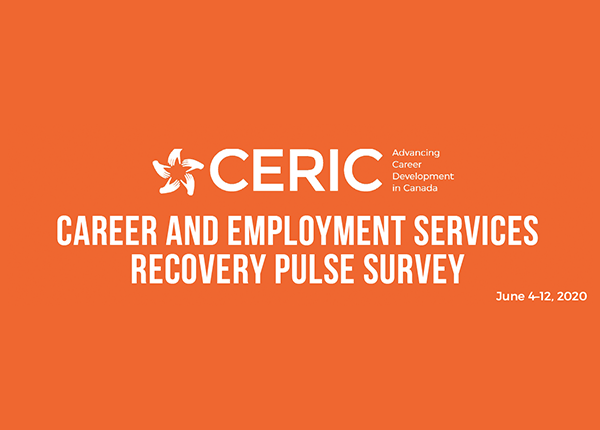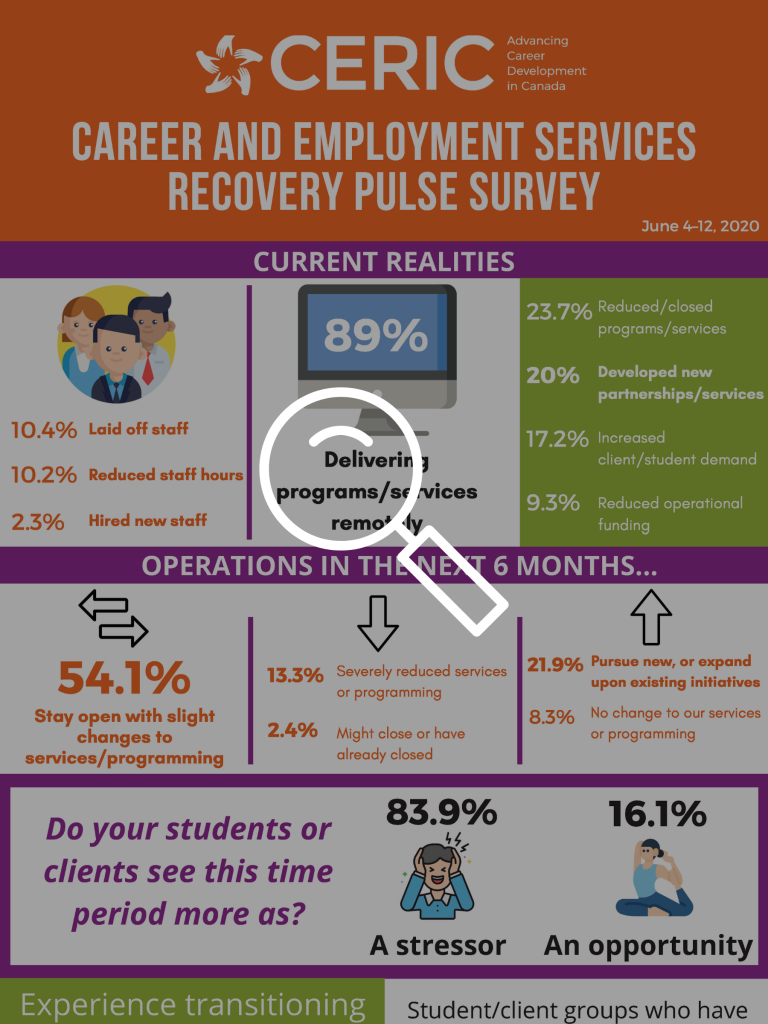
Joint letter to the Canadian Chamber of Commerce about getting Canadians back to work
June 12, 2020
CERIC to publish edition of popular Retain and Gain Playbook to support career management in the public sector
June 23, 2020Despite vast and ongoing challenges presented by the current global pandemic, Canada’s career and employment services are showing remarkable resilience and innovation as they reimagine their work. By leveraging technology, 89% are reporting they are delivering programs and services remotely, introducing novel approaches to meet student, client and employer needs. These findings come from the new CERIC Recovery Pulse Survey, which gathered input on the impact of COVID-19 on career services across the country as we move into a recovery period. A total of 1,146 career development professionals responded to the survey between June 4 and 12.
Using videoconferencing in addition to phone, email and chat to support clients has now become standard. Some of the other ways that career and employment services are enhancing their offerings include: creating videos and podcasts to deliver remote job search guidance, developing programming for Instagram and YouTube, offering virtual career fairs, hosting Twitter chats, preparing clients for digital interviews, working with employers to secure opportunities for students to do virtual placements and even buying tablets for clients to offset access issues. There is recognition that remote service delivery can be difficult for some vulnerable populations, but career professionals highlighted that it can also increase access, improve digital literacy and strengthen adaptability.
Comments about the transformation of career services include:
- “It has forced us to review what we offer and how we offer it and to make it more streamlined and relevant.”
- “An opportunity for clients to really take the time to research and determine a career change or career path.”
- “Partnering with other service providers to offer remote advice, webinars and online information that they previously needed to do in-house.”
- “In an attempt to understand the ‘new normal,’ I have been challenged to be more creative, more empathetic and broad-thinking in my approach to everything.”
- “Offering more services remotely in future – expand our geographic territory, more accessible to those with transportation or mobility or childcare challenges.”
- “Tapping into clients’ resilience to face challenges and foster flexibility in their job search.”
However, current realities are presenting very real challenges to the viability of many organizations with nearly a quarter (23.7%) reporting they have had to reduce or close programs and services; 1 in 5 have had to lay off staff or reduce staff hours. Meanwhile, 17.2% of respondents report increased demand for their services from students and clients, and 1 in 5 organizations have been able to develop new partnerships and initiatives. The future remains uncertain: more than half of respondents (54.1%) expect to be open six months from now with limited impact on their operations, while 21.9% anticipate they will be able to grow their services.
Overall, career development professionals reported that among their students and clients, 83.9% see this time period as a stressor and only 16.1% as an opportunity. They indicate that clients with mental health challenges are among the groups most negatively affected, followed by unemployed and low-income individuals. Among respondents, 44.1% say their clients are only somewhat or poorly equipped to handle the mental health impact of the situation.
With the goal of this survey to gather vital intelligence around the changing state of the career development field in Canada during the recovery, there are plans to repeat the Pulse Survey again at the end of the summer and during the fall to track changes over time. Results will continue to show shifts in how career services are being reimagined and tell the story of the public good that career and employment professionals offer in this period of massive workforce upheaval.


